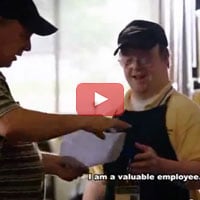Getting a Job
There’s nothing like the feeling of getting that first paid job. Some youth with disabilities may feel like paid employment is out of their reach, but it does not have to be. Families and youth can work towards that first job by focusing on building skills employers want, developing good work habits, discussing the impact of disability if necessary, and showcasing talents and a positive attitude during the interview process.
To successfully transition to adulthood, all youth should be exposed to a range of work-based exploration experiences such as site visits, community service, job shadowing, and paid and unpaid internships. Unfortunately, it is estimated that only one-third of young people with disabilities who need job training receive it.
To adequately prepare youth for real-world employment, career and technical education should be based on state or industry standards, and youth should be taught using varied learning strategies that are appropriate to each individual.
In order to help youth make informed choices, youth should undergo a career assessment that includes, but is not limited to, interest inventories, and formal and informal vocational assessments. They should also be exposed to job training and career opportunities that provide a living wage.
Parents also play an important role in providing invaluable career guidance and support to young adults with and without disabilities. Parents help teenagers prepare for adult work by providing positive adult models to follow; exposure to careers and occupations; clear expectations -- neither too high nor too low; contacts and networks in the community; and values and attitudes such as discipline, concentration, and a willingness to take on challenges.
Finding a job may seem like a daunting task for someone with a disability. People with disabilities are often uncertain as to what kinds of jobs are available to them and whether they are qualified to do those jobs. In fact, it is common for persons with disabilities to underestimate their own skills and abilities when looking for a job. While it is natural to have fears about entering the workforce, remember this: no matter what your disability, there is a job out there for you. It may take more time and effort to find that job, but it can be done!
Volunteerism & Service Learning Links
- Understanding Volunteering
This PACER article explores how volunteering can help youth discover and explore their interests, skills, and dreams as they relate to potential employment. - How Volunteering Can Help You Find Employment
This article outlines how volunteering can help you connect with others with similar interests, develop new skills and even jumpstart a career. - Youth Volunteerism: How Engaging Young Volunteers Can Benefit Organizations and Individuals
Regular access to civic-engagement opportunities can lead to better outcomes for children, young adults, and their communities. Youth who volunteer are more likely to perform better in school and work and become civically active adults. - Volunteer.gov
A website run by a federal interagency team that provides applicants with all that they need to find a volunteer opportunity, and serves to help them make the best match possible between their personal requirements and their choice of volunteer work throughout America’s vast land base and expansive resources. The Portal is a free, fast and efficient way to connect volunteers with natural and cultural resources agencies. - AmeriCorps
Service learning opportunities are open to U.S. citizens, nationals, or lawful permanent residents aged 17 or older. Members serve full or part time over a 10- to 12-month period. a After successfully completing a term of service, AmeriCorps members who are enrolled in the National Service Trust are eligible to receive an education award. - The International Volunteer Programs Association
Has an up-to-date search site for international volunteer and internship opportunities - Volunteer Match
Potential volunteers enter their zip code to find volunteer opportunities. - Understanding Internships
For a student with disabilities, transitioning to the world of work requires careful planning, often involving the cooperative efforts of the student and his or her family members, along with school personnel, adult service providers and employers. Planning for employment involves the discovery of a student’s interests, skills and dreams and how each of these may relate to potential employment. Internships provide a way to explore the employment world.
Videos

Work Early, Work Often: Parents/Caregivers of Young Adults with Disabilities

Skills to Pay the Bills: Networking

Skills to Pay the Bills:
Enthusiasm and Attitude
For more videos on this topic, visit our Videos page.
Resources
- Building a Resumé: Tips for Youth with Disabilities
- Tapping into the Power of Families: How Families of Youth with Disabilities Can Assist in Job Search and Retention (April 2011)
- Preparing for Employment: On the Home Front
Describes ways in which youth and families can help youth effectively explore work-based learning outside of school settings. - Understanding the New Vision for Career Development: The Role of Family
Info Brief developed by PACER for the National Collaborative on Workforce and Disability for Youth - How Young People Can Benefit from One-Stop Centers





